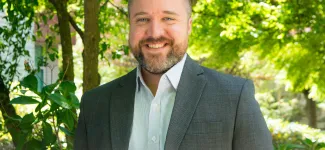We talked to Gabriel Potvin, instructor in the Department of Chemical and Biological Engineering and Chair of the Applied Science Program at Vantage College, about what's on his reading list.
Is there a specific book that inspired you to pursue work around teaching and learning innovation?
I can't say there is a specific book that got me interested in teaching and learning. Recently, I read Why Don't Students Like School? by Daniel T. Willingham, and Don't Be Such a Scientist: Talking Substance in an Age of Style by Randy Olson. The former talks about effective teaching in a classroom; and the latter, about effective science communication in public settings. Both discuss to the importance of narrative and emotion for the effective communication and learning of technical concepts, which is what we do as instructors.
What books are currently on your bedside table?
There's always a stack of books on my bedside table. I am currently reading Gödel, Escher, Bach: an Eternal Golden Braid, by Douglas Hofstadter, dealing with how complex processes and meaning (ultimately as they relate to consciousness and intelligence) can emerge from formal systems and rules and "meaningless" elements and mechanisms (such as those governing neurobiology), and draws examples from mathematics and art. Fascinating book. I am also reading Bismarck: A Life by Jonathan Steinberg, a sometimes dry but very well researched biography of Otto von Bismarck, who was himself a fascinating figure of history.
What do you recommend reading over the winter holidays?
Although maybe not in-line with the holiday spirit, but because it is an absorbing way to disconnect, I recommend the Three Body Problem sci-fi epic trilogy by Chinese author Cixin Liu (The Three Body Problem, The Dark Forest, and Death's End), which tells the story of how humanity reacts to contact with an alien civilization and a less than hospitable universe over the span of several centuries. Each of the books is very original and provides unique perspectives on humanity and its future development, and the science underlying the story, though maybe not strictly correct, is believable enough to make the story enjoyable. The first book of the series was the first non-English book (translated from Chinese) to have won the Hugo Award.
